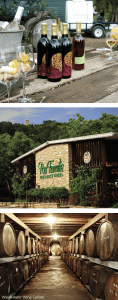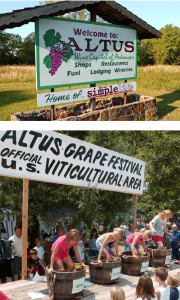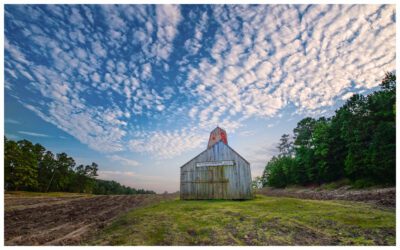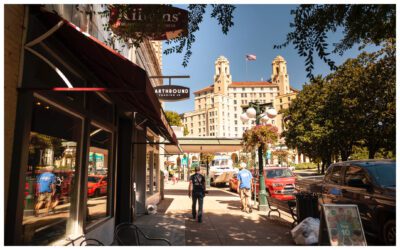[title subtitle=”words: Dwain Hebda
image: courtesy Arkansas Department of Parks & Tourism “][/title]
Imagine a day trip or weekend in wine country where unique wineries offer sweeping vistas as you enjoy tasting the local fare joined by fellow fans of the grape. Or join in the revelry of wine festivals that celebrate the local industry until the sun dips below the well-tended vineyards.
If this sounds exciting, you’re in luck. It won’t require a trip to Napa Valley or Europe. It’s right here in Arkansas along a fertile stretch known as the Arkansas Wine Trail, with wineries stretching from Bentonville and Tontitown in the northwest to Subiaco and Paris in the Arkansas River Valley to Little Rock.
But the epicenter of this industry, and the oldest stretch of the Trail, thrives around tiny Altus in Franklin County, which just might be the best-kept secret in the state.
 “A lot of people don’t realize that [Arkansas has] one of the oldest and largest wine regions,” said Audrey House, founder of Chateau Aux Arc Vineyards and Winery. “Actually, we were an AVA [American Viticultural Area] before Napa, so we were right in line as recognized as an old growing region.”
“A lot of people don’t realize that [Arkansas has] one of the oldest and largest wine regions,” said Audrey House, founder of Chateau Aux Arc Vineyards and Winery. “Actually, we were an AVA [American Viticultural Area] before Napa, so we were right in line as recognized as an old growing region.”
Audrey’s operation is a stylish affair, fifty acres in all, that includes a gorgeous 5,600-square-foot tasting room completed in 2005 under the spreading arms of an ancient oak tree. But the newer amenities aren’t nearly as impressive as Chateau Aux Arc’s backstory, which began with a twenty-one-year-old Audrey buying twenty acres and a tent which was her shelter while she built her house.
Audrey knew nothing of grapes or the wine business, learning it literally from the ground up from other local growers and sampling wine from one end of the country to the other. “It was a matter of opening my mind with all of the traditions and learning as much as I could from everybody and asking the right questions and being willing to work for free to get that knowledge,” she said. “Tasting over 500 wineries from California to New York in a short period of time helped me create protocols and learn how to do things, though not necessarily by the book.
“It’s the uniqueness of wine,” she said. “It’s liquid art, and it’s also liquid love.”
Audrey’s age and background are relatively rare on this stretch of the Wine Trail, which includes a clutch of five operations around Altus. Most of the other wineries here are much older than hers with decades of history to their credit. These include large, well-known operations Post Familie Winery and Wiederkehr Wine Cellars which date back to the 1880s and the smaller family-run winery Mount Bethel, founded in 1956. Two-year-old boutique Dionysus Wine and Brew round out the offerings.
Sharla Kay Wiederkehr and her husband Dennis, recently named president of the original family operation up the road, launched Dionysus as a labor of love in the community. Dionysus is by far the smallest of the Altus operations and its wines are produced out-of-state, but it has one thing the other wineries can’t claim, a yurt available for overnight accommodations right on premises.
 “We’ve always wanted to do something different,” Sharla Kay said. “I’ve worked forty-three years at my other job, and Dennis always wanted his own little winery, just for something fun. That’s why we did this, and we did the yurt because there weren’t many places for people to stay.”
“We’ve always wanted to do something different,” Sharla Kay said. “I’ve worked forty-three years at my other job, and Dennis always wanted his own little winery, just for something fun. That’s why we did this, and we did the yurt because there weren’t many places for people to stay.”
There’s a palpable sense of camaraderie as you visit the various operations. Altus’ population, about 750, means everyone knows everyone and their families have for more than a century. Take the Post family, for instance. Not only does it claim one of the 100 largest wineries in the country, founded by Jacob Post, but his son Joseph and daughter-in-law Katherine launched a winery next door that is today Mount Bethel Winery. Wiederkehr, incorporated as its own village in 1975, sold Audrey the acreage from which Chateau Aux Arc sprang. You get the idea how the wine family tree has unfolded.
Michael Post, owner of Mount Bethel Winery, revels in these historical connections. His tranquil farm and vineyards give visitors a living diorama of what generations of his family built. The centerpiece here is the original hand-dug cellar that serves as the region’s most unique tasting room. It’s a testament both to the founders’ profession and their faith, having helped build nearby St. Mary Catholic Church looming from a high point above the town.
“There’s a lot of history and legacy, I guess, in my family around that cellar,” Michael said, “that was built right around the turn of the century, around 1900. If you’ve been up to St. Mary’s Church, the cornerstone of that church is 1901. The reason I mention that is because the cellar is mostly just made of rock, but there are a few stones in there, if you look in the right place, that were quarried from the same place as the stone was that was used to build the church.”
Arkansas’ winemaking tradition was carried here by the Swiss and German immigrants of the early to mid-1800s. The floodgates opened around 1870 when many were lured to Arkansas by promises of steady employment or cheap land, one and the same thing in the case of winemakers.
The first wines were made using the wild fruit found in abundance and several of today’s local winemakers still produce these traditional wines made from various native berries. But it wasn’t long before farmers were growing their own grapes specific to their purpose. Over time many new grapes have also been developed including the Cynthiana, named Arkansas’ official grape in 2009.
Arkansas’ wineries peaked at about 150, but many closed due to dry county laws. The entire industry was nearly stamped out by Prohibition, during which wineries like Post and Wiederkehr limped along making sacramental wine for religious purposes. Of course, some operators took a more defiant stand, including Katherine Post, who did a stretch for illegally carrying on the family business.
“The primary source of employment in this area was the coal mines,” Michael Post said. “A lot of people were German and Swiss and German-speaking immigrants, and it was in their nature to come by in the afternoon and grab a sandwich at her—I guess you might say—deli-style restaurant.
“Katherine Post was known in the area as ‘Ma Post’; people would come by, and she would serve sandwiches and, of course, a glass of wine. That was the European culture.”
Spring or fall is recommended for visits to the area, due to the wine festivals that are held to celebrate the grape. But any time of year is perfect for planning a trip to get your taste of European history, aged to Ozark perfection.
Chateau Aux Arc Vineyards & Winery
479.468.4400
chateauauxarc.com
Dionysus Wine & Brew
479.209.1234
dionysuswinebrew.com
Mount Bethel Winery
479.468.2444
mountbethel.com
Post Familie Winery
479.468.2741
postfamilie.com
Wiederkehr Wine Cellars
800.622.9463
Wiederkehrwines.com




